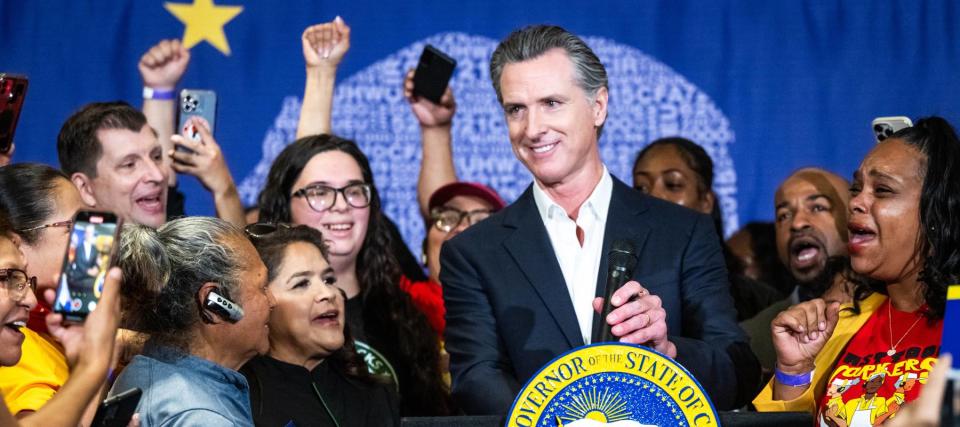'A devastating financial blow': California's so-called 'draconian' fast-food bill is now law — here's why McDonald's franchisees say it'll cost small business owners $250K a year

Amid a throng of cheering workers and labor leaders, California Governor Gavin Newsom delivered news that would change many of their lives. The Democratic leader had signed into law a bill to increase wages for fast-food workers across the state.
The new AB 1228 legislation, or the Fast Food Franchisor Responsibility Act, will give fast-food employees in California the highest guaranteed base pay in the industry nationwide.
“This is a big deal,” Newsom exclaimed during a press conference in Los Angeles on Sept. 28. “What a remarkable moment.”
Meanwhile, the National Owners Association (NOA), a group that represents more than 1,000 McDonald’s franchise owners, has slammed the landmark bill for its “draconian” rules.
Don't miss
Commercial real estate has outperformed the S&P 500 over 25 years. Here's how to diversify your portfolio without the headache of being a landlord
Rich young Americans have lost confidence in the stock market — and are betting on these 3 assets instead. Get in now for strong long-term tailwinds
‘A natural way to diversify': Janet Yellen now says Americans should expect a decline in the USD as the world's reserve currency — 3 ways you can prepare
In addition to the minimum wage increase for fast-food workers, which comes into effect April 1, 2024, the bill also establishes a council that can approve further wage increases in the future.
But the NOA has expressed concerns the law would bring on costs that “simply cannot be absorbed by the current business model.”
The group claims that 95% of the 1,300 McDonald’s restaurants in California are locally owned and operated by small business owners.
“The new AB 1228 legislation has been voted into law and will result in a devastating financial blow to California McDonald’s franchisees at a projected annual cost of $250,000 per McDonald’s restaurant,” the NOA said in a memo obtained by Fox Business
What's in the bill?
AB 1228 applies to fast-food chains with at least 60 locations nationwide — except for those that make and sell their own bread. The bill’s landmark change is a minimum wage hike to $20 per hour, almost $5 higher than the Golden State’s minimum wage of $15.50.
It would also see the establishment of a Fast Food Council to set wages and make recommendations for working conditions. The council has the power to increase the new minimum wage each year through 2029 up to 3.5% or the average change in the Consumer Price Index for urban wage earners, whichever is lower.
One key part of the bill has been removed since its proposal. Previously, AB 1228 would have made fast-food corporations jointly liable if franchisees committed labor violations, which the NOA believes could have led to “frivolous lawsuits against franchisees” that would then force the larger corporate head offices to exert more control over local operations.
“That was a tectonic plate that had to be moved,” Newsom said, referring to what he recalled were the more than 100 hours of negotiations that took place to reach an agreement between industry and labor groups.
Read more: Thanks to Jeff Bezos, you can now use $100 to cash in on prime real estate — without the headache of being a landlord. Here's how
What now?
In exchange for the dropped attempt to make corporations liable for the misdeeds of franchisees, industry leaders agreed to pull a voter initiative that would have triggered a referendum related to worker wages in 2024, giving way to the wage increases included in the bill.
Fast-food workers in California will have to wait until April 1 of next year to reap those benefits in full; however, they may receive a small bump in the new year when the state’s minimum wage for all employees increases to $16 per hour on Jan. 1, 2024.
As for the NOA, it has expressed concerns that the passage of the bill could lead to similar efforts by legislative bodies across the country — efforts it says may jeopardize franchisees’ ability to make local business decisions.
“We need to remain unified so that this can not gain a foothold anywhere else,” the NOA said, per Fox Business.
Editor's note, Sept. 29, 2023: A previous version of this article indicated that AB 1228, when passed by the California Senate, would have made fast-food franchisors jointly liable if franchisees committed labor violations. This was amended out of the bill. Correction: The final quote, previously attributed to Roger Delph, was actually from the NOA.
What to read next
Worried about the economy? Here are the best shock-proof assets for your portfolio. (They’re all outside of the stock market.)
Rising prices are throwing off Americans' retirement plans — here's how to get your savings back on track
Jeff Bezos and Oprah Winfrey invest in this asset to keep their wealth safe — you may want to do the same in 2023
This article provides information only and should not be construed as advice. It is provided without warranty of any kind.
